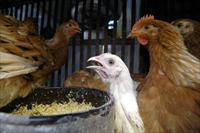BURUNDI: Fatal chicken disease a blow to food security

Thursday, July 3, 2008
Food
security in Burundi’s Kayanza province is under threat because of an
untreatable disease that has killed more than 1,000 chickens in one
commune, according to a senior official.
"The disease has also been reported in other parts of the country but total numbers of dead chickens are not [yet] available," the director of the Animal Health Department in the Ministry of Agriculture and Stockbreeding, Pierre Bukuru, told IRIN.
"With the pandemic among the chickens, the population will face a significant lack of animal proteins and many people will suffer from the shortage, as chicken is widely raised and consumed in Burundi," he added.
Bukuru said the illness, which has similar symptoms to Newcastle Disease, was affecting the economic lives of people raising chickens or trading in meat and eggs.
"Egg production has dropped by 80 percent," he said.
He added that the meat of infected chickens did not pose a threat to human health as long as it was well-cooked.
And although the disease itself can be passed on to humans, the only effects are mild conjunctivitis.
Laboratory tests were being carried out to determine the precise identity of the disease, although he ruled out the possibility of it being avian influenza.
"Bird flu has not yet reached Burundi up to now," Bukuru said.
No treatment is available for the disease, and although chicks can be vaccinated, doing so would be impractical in a country where most poultry is kept by individual households.
"The disease has also been reported in other parts of the country but total numbers of dead chickens are not [yet] available," the director of the Animal Health Department in the Ministry of Agriculture and Stockbreeding, Pierre Bukuru, told IRIN.
"With the pandemic among the chickens, the population will face a significant lack of animal proteins and many people will suffer from the shortage, as chicken is widely raised and consumed in Burundi," he added.
Bukuru said the illness, which has similar symptoms to Newcastle Disease, was affecting the economic lives of people raising chickens or trading in meat and eggs.
"Egg production has dropped by 80 percent," he said.
He added that the meat of infected chickens did not pose a threat to human health as long as it was well-cooked.
And although the disease itself can be passed on to humans, the only effects are mild conjunctivitis.
Laboratory tests were being carried out to determine the precise identity of the disease, although he ruled out the possibility of it being avian influenza.
"Bird flu has not yet reached Burundi up to now," Bukuru said.
No treatment is available for the disease, and although chicks can be vaccinated, doing so would be impractical in a country where most poultry is kept by individual households.
Source: IRIN NEWS http://irinnews.org
 Back and Next - Back and Next
Back and Next - Back and Next See Also - See Also
See Also - See Also